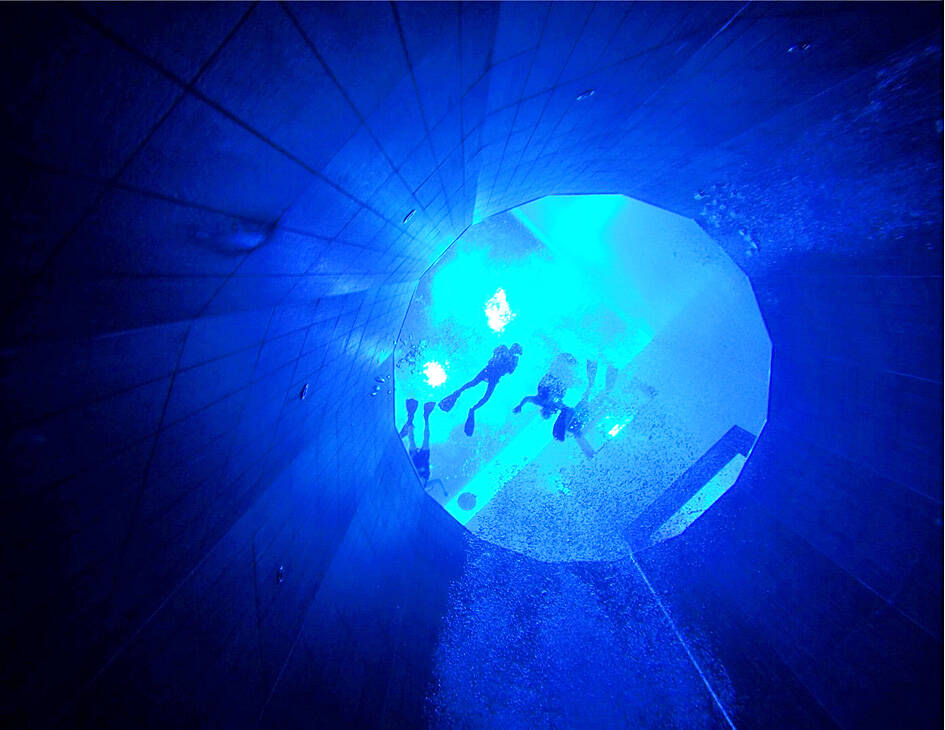A student diver who lost consciousness while training at Taichung’s Divecube Hotel on Sunday is recovering and in a stable condition, hospital officials said.
The 20-year-old student, surnamed Yang (楊), likely blacked out during the dive, the officials said, adding that they are monitoring his condition to ensure he has fully recovered.
Yang was among several students taking instruction from an outside diving coach when he blacked out during the training, Divecube director Wang Ching-ping (王景平) said.

Photo courtesty of a reader
“People onsite pulled him out, but in the haste, the student got bumped on the head, sustaining bruises and slight bleeding,” Wang said.
“Our coaching staff gave him oxygen to help him breathe and he had regained consciousness by the time the ambulance arrived,” he said.
“The student told our staff that he just felt more tired than usual... We helped him to the ambulance and will continue to follow up and provide assistance for his recovery if needed,” he added.
Touting itself as Asia’s deepest diving pool, the DiveCube is 21m deep — equivalent to a seven-story building. It has five diving depths — 1.3m, 3m, 7m, 11m and 21m.
Aside from diving, the hotel offers accommodation, water recreation and other leisure activities.
A certified diving coach, who identified himself as “A-ping,” said free-diving might be appealing, but it is quite a dangerous activity.
Free-divers do not use oxygen tanks, so they have to hold their breath for as long as they can, he said.
It is attractive to swimmers as they are unencumbered by artificial devices and can move in the water freely, getting as close as possible to sea creatures, he added.
However, holding their breath for a certain period could cut off the oxygen supply to their brain, leading to blackouts or loss of consciousness, he said.
“Most beginners are not aware of this, and tragedy can often happen. Blacking out is definitely a nightmare for people engaged in free-diving, so people must be aware of this,” he said.

TRAFFIC SAFETY RULES: A positive result in a drug test would result in a two-year license suspension for the driver and vehicle, and a fine of up to NT$180,000 The Ministry of Transportation and Communications is to authorize police to conduct roadside saliva tests by the end of the year to deter people from driving while under the influence of narcotics, it said yesterday. The ministry last month unveiled a draft of amended regulations governing traffic safety rules and penalties, which included provisions empowering police to conduct mandatory saliva tests on drivers. While currently rules authorize police to use oral fluid testing kits for signs of drug use, they do not establish penalties for noncompliance or operating procedures for officers to follow, the ministry said. The proposed changes to the regulations require

Taipei, New Taipei City, Keelung and Taoyuan would issue a decision at 8pm on whether to cancel work and school tomorrow due to forecasted heavy rain, Keelung Mayor Hsieh Kuo-liang (謝國樑) said today. Hsieh told reporters that absent some pressing reason, the four northern cities would announce the decision jointly at 8pm. Keelung is expected to receive between 300mm and 490mm of rain in the period from 2pm today through 2pm tomorrow, Central Weather Administration data showed. Keelung City Government regulations stipulate that school and work can be canceled if rain totals in mountainous or low-elevation areas are forecast to exceed 350mm in

The Executive Yuan yesterday announced that registration for a one-time universal NT$10,000 cash handout to help people in Taiwan survive US tariffs and inflation would start on Nov. 5, with payouts available as early as Nov. 12. Who is eligible for the handout? Registered Taiwanese nationals are eligible, including those born in Taiwan before April 30 next year with a birth certificate. Non-registered nationals with residence permits, foreign permanent residents and foreign spouses of Taiwanese citizens with residence permits also qualify for the handouts. For people who meet the eligibility requirements, but passed away between yesterday and April 30 next year, surviving family members

1.4nm WAFERS: While TSMC is gearing up to expand its overseas production, it would also continue to invest in Taiwan, company chairman and CEO C.C. Wei said Taiwan Semiconductor Manufacturing Co (TSMC) has applied for permission to construct a new plant in the Central Taiwan Science Park (中部科學園區), which it would use for the production of new high-speed wafers, the National Science and Technology Council said yesterday. The council, which supervises three major science parks in Taiwan, confirmed that the Central Taiwan Science Park Bureau had received an application on Friday from TSMC, the world’s largest contract chipmaker, to commence work on the new A14 fab. A14 technology, a 1.4 nanometer (nm) process, is designed to drive artificial intelligence transformation by enabling faster computing and greater power